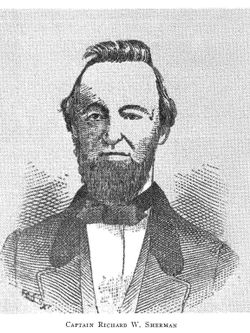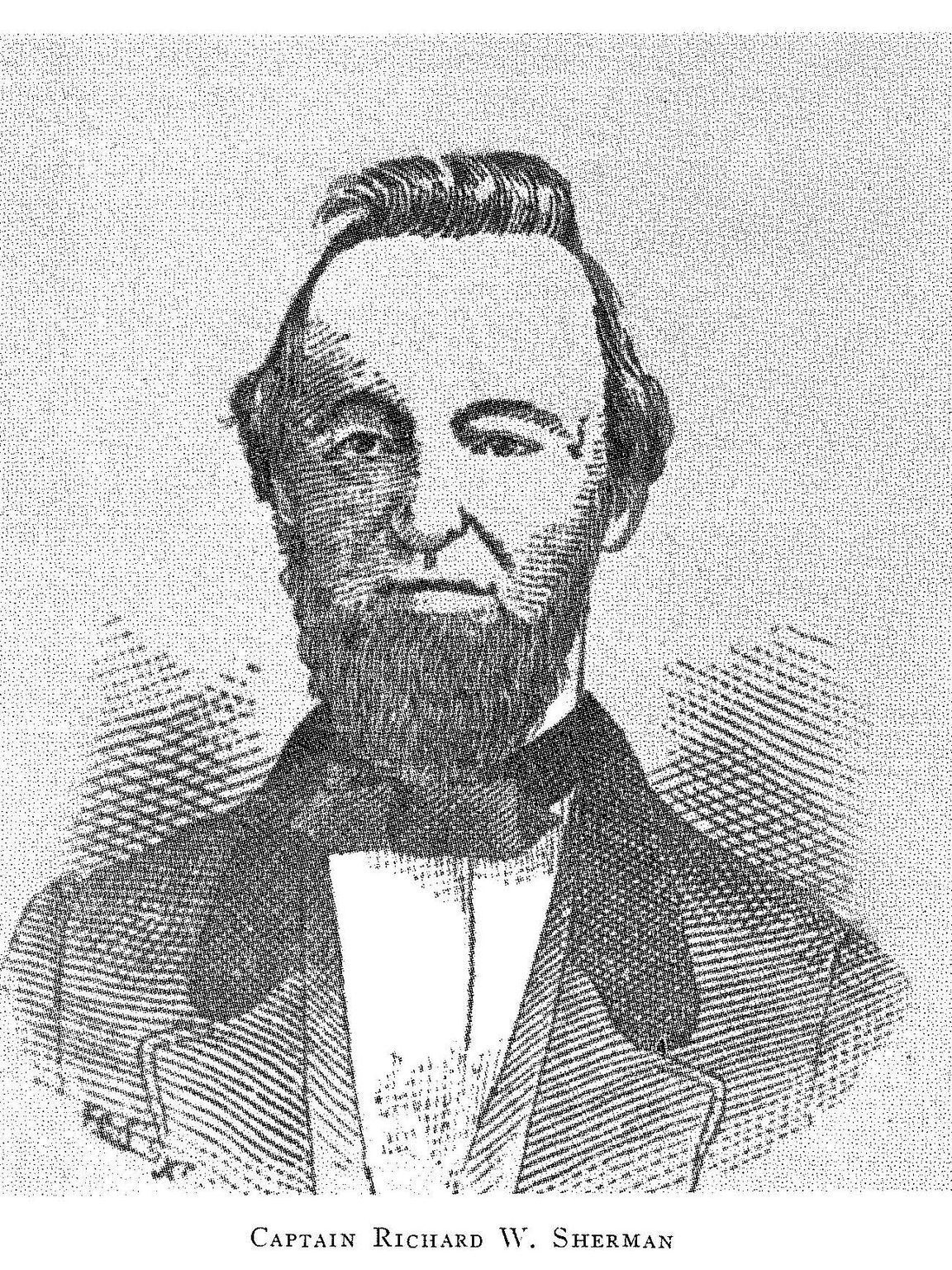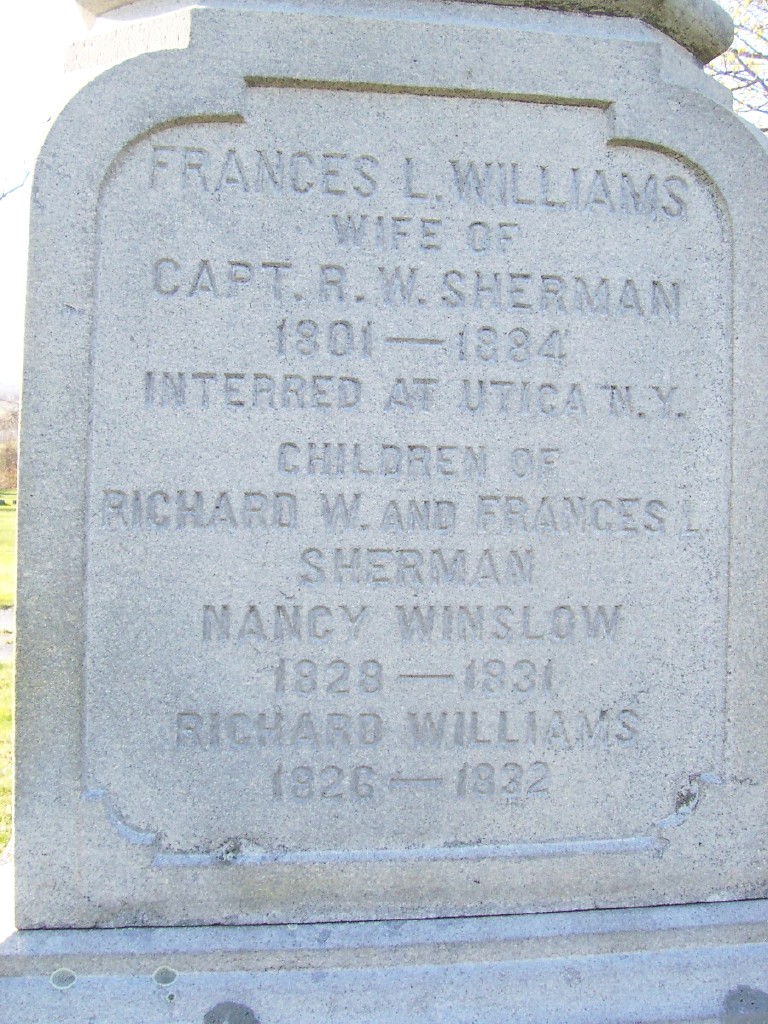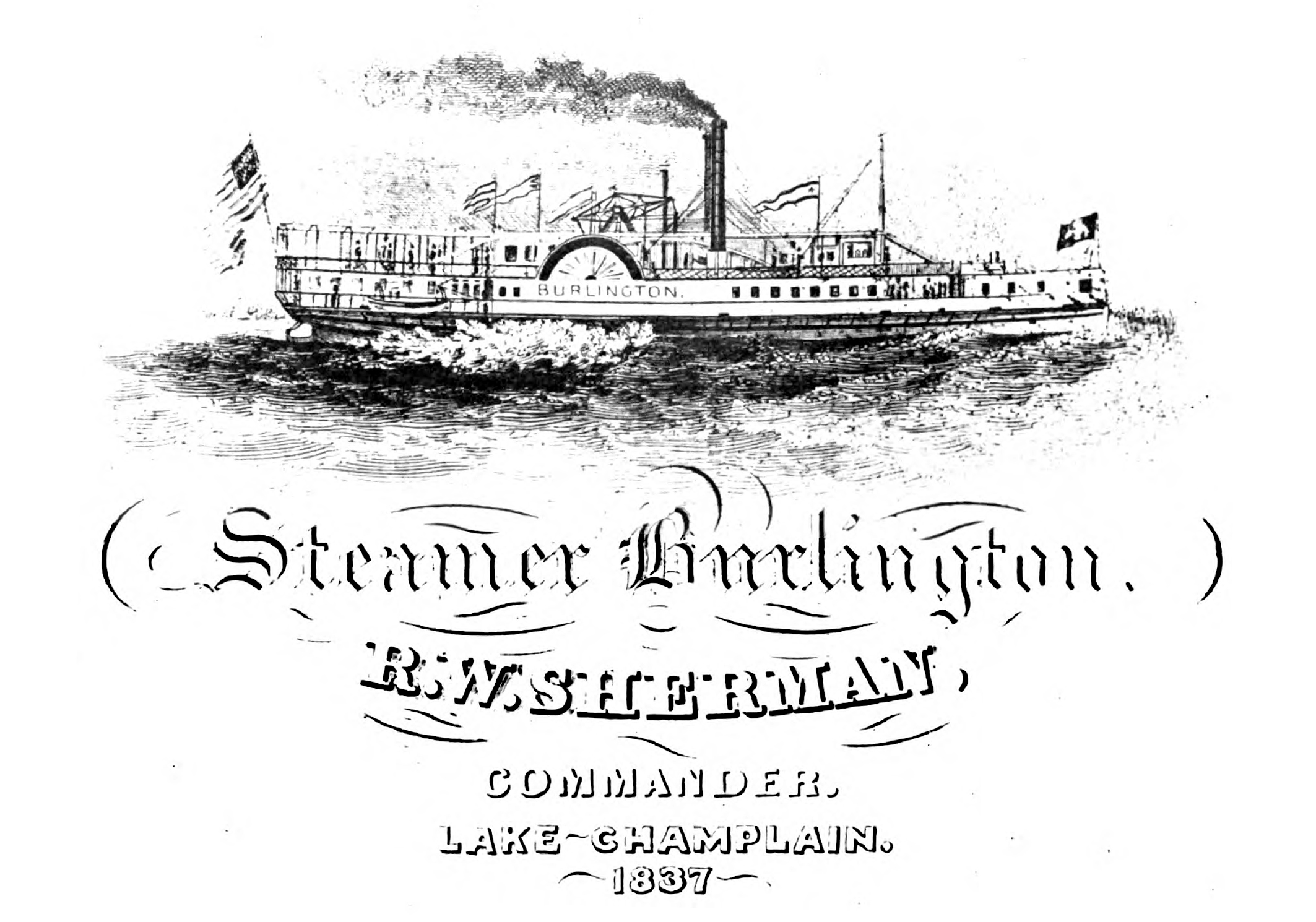"A New Yorker by birth, he was the eldest of three sons. Early embracing steamboat life, (his father being the third captain Robert Fulton employed), he in 1815, just after the war, took command of the "Champlain" and afterwards of the "Phoenix," with which vessel he remained until her memorable destruction by fire off Providence Island, when he played so heroic a part in saving the lives of his passengers.
In 1824 he left our lake waters to take command of the "Chief Justice John Marshall," then one of the finest passenger steamboats on the North River.
Returning to Lake Champlain in 1837, he was at once put in command of the "Franklin" and the trod the deck of the old "Burlington," until his retirement in 1846."
In the 1930 history of the Lake Champlain Transportation Company, The Steamboats of Lake Champlain, 1809-1930, its author writes about Sherman:
"It is a little difficult at this time to realize to what an extent a particular vessel and its commander stirred the public imagination and popular emotion. Steamboating had gradually become America's "Grand Passion," and for it, and to the men engaged in it, the public readily prepared a pedestal. Trained by his father, Captain Jahaziel Sherman, at this time a Director of The Champlain Transportation Company, young Richard W. Sherman had early won popular esteem for his coolness and courage on the night of the burning of the first Phoenix. Quick to see the advantages of system and order inaugurated by his father in handling a steamboat, R. W. Sherman carried them into greater detail and, having first become thoroughly familiar with every phase of his work, he established on the Burlington such a system of discipline and order as could not have been excelled on a man-of-war. Combined with the fine vessel he commanded, the result was to make the Burlington celebrated as the "paragon of steamers" both in America and Europe.
"There is no doubt but that Captain Sherman was a bit of an autocrat and that he catered largely to the "best people". In 1840, President Martin Van Buren was a passenger on the Burlington, and, on boarding the vessel, one of his staff asked him if he did not desire to meet this famous commander. The President replied, "No. I know Sherman. He thinks the world is a steamboat and he is the Captain". Later, however, the President did meet Captain Sherman and was a guest at his table. It is perhaps not out of place to remark here that Captain Sherman's grandson, James S. Sherman, became Vice President of the United States some sixty years later.
"[In 1842] ..., while engaged in his celebrated tour of the United States and Canada, the great English novelist, Charles Dickens, made the passage of the lake on this famous steamer and on his return to England, recorded his impressions of the Burlington in his volume of American Notes, as follows:
"There is one American boat -- the vessel which carried us on Lake Champlain, from St. Johns to Whitehall-which I praise very highly, but no more than it deserves, when I say that it is superior even to that in which we went from Queenstown to Toronto, or to that in which we traveled from the latter place to Kingston, or I have no doubt I may add, to any other in the world. The steamboat which is called the Burlington, is a perfectly exquisite achievement of neatness, elegance and order. The decks are drawing rooms; the cabins are boudoirs, choicely furnished and adorned with prints, pictures, and musical instruments; every nook and comer of the vessel is a perfect curiosity of graceful comfort and beautiful contrivance. Captain Sherman, her commander, to whose ingenuity and excellent taste these results are solely attributable, has bravely and worthily distinguished himself on more than one trying occasion; not the least among them, in having the moral courage to carry British troops, at a time (during the Canadian rebellion) when no other conveyance was open to them. He and his vessel were held in universal respect, both by his own countrymen and ours; and no man ever enjoyed the popular esteem, who, in his sphere of action, won and wore it better than this gentleman."
-----------
In 1821, Sherman had married Frances L. Williams (1801-1884) of Conway, Massachusetts, with whom they had three daughters and a son, although only their daughters Mary Frances and Cornelia lived beyond the age of six. Sherman's wife appears to have moved to Utica after her husband died, where her daughter Mary was living with her family.
"A New Yorker by birth, he was the eldest of three sons. Early embracing steamboat life, (his father being the third captain Robert Fulton employed), he in 1815, just after the war, took command of the "Champlain" and afterwards of the "Phoenix," with which vessel he remained until her memorable destruction by fire off Providence Island, when he played so heroic a part in saving the lives of his passengers.
In 1824 he left our lake waters to take command of the "Chief Justice John Marshall," then one of the finest passenger steamboats on the North River.
Returning to Lake Champlain in 1837, he was at once put in command of the "Franklin" and the trod the deck of the old "Burlington," until his retirement in 1846."
In the 1930 history of the Lake Champlain Transportation Company, The Steamboats of Lake Champlain, 1809-1930, its author writes about Sherman:
"It is a little difficult at this time to realize to what an extent a particular vessel and its commander stirred the public imagination and popular emotion. Steamboating had gradually become America's "Grand Passion," and for it, and to the men engaged in it, the public readily prepared a pedestal. Trained by his father, Captain Jahaziel Sherman, at this time a Director of The Champlain Transportation Company, young Richard W. Sherman had early won popular esteem for his coolness and courage on the night of the burning of the first Phoenix. Quick to see the advantages of system and order inaugurated by his father in handling a steamboat, R. W. Sherman carried them into greater detail and, having first become thoroughly familiar with every phase of his work, he established on the Burlington such a system of discipline and order as could not have been excelled on a man-of-war. Combined with the fine vessel he commanded, the result was to make the Burlington celebrated as the "paragon of steamers" both in America and Europe.
"There is no doubt but that Captain Sherman was a bit of an autocrat and that he catered largely to the "best people". In 1840, President Martin Van Buren was a passenger on the Burlington, and, on boarding the vessel, one of his staff asked him if he did not desire to meet this famous commander. The President replied, "No. I know Sherman. He thinks the world is a steamboat and he is the Captain". Later, however, the President did meet Captain Sherman and was a guest at his table. It is perhaps not out of place to remark here that Captain Sherman's grandson, James S. Sherman, became Vice President of the United States some sixty years later.
"[In 1842] ..., while engaged in his celebrated tour of the United States and Canada, the great English novelist, Charles Dickens, made the passage of the lake on this famous steamer and on his return to England, recorded his impressions of the Burlington in his volume of American Notes, as follows:
"There is one American boat -- the vessel which carried us on Lake Champlain, from St. Johns to Whitehall-which I praise very highly, but no more than it deserves, when I say that it is superior even to that in which we went from Queenstown to Toronto, or to that in which we traveled from the latter place to Kingston, or I have no doubt I may add, to any other in the world. The steamboat which is called the Burlington, is a perfectly exquisite achievement of neatness, elegance and order. The decks are drawing rooms; the cabins are boudoirs, choicely furnished and adorned with prints, pictures, and musical instruments; every nook and comer of the vessel is a perfect curiosity of graceful comfort and beautiful contrivance. Captain Sherman, her commander, to whose ingenuity and excellent taste these results are solely attributable, has bravely and worthily distinguished himself on more than one trying occasion; not the least among them, in having the moral courage to carry British troops, at a time (during the Canadian rebellion) when no other conveyance was open to them. He and his vessel were held in universal respect, both by his own countrymen and ours; and no man ever enjoyed the popular esteem, who, in his sphere of action, won and wore it better than this gentleman."
-----------
In 1821, Sherman had married Frances L. Williams (1801-1884) of Conway, Massachusetts, with whom they had three daughters and a son, although only their daughters Mary Frances and Cornelia lived beyond the age of six. Sherman's wife appears to have moved to Utica after her husband died, where her daughter Mary was living with her family.
















